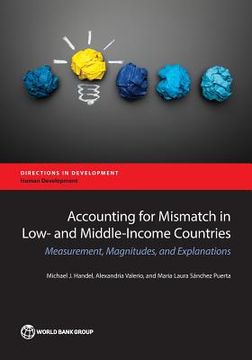Share
Accounting for Education Mismatch in Developing Countries: Measurement, Magnitudes, and Explanations (in English)
Alexandria Valerio
(Author)
·
Michael J. Handel
(Author)
·
World Bank Publications
· Paperback
Accounting for Education Mismatch in Developing Countries: Measurement, Magnitudes, and Explanations (in English) - Handel, Michael J. ; Valerio, Alexandria ; Laura Sanchez Puerta, Maria
$ 38.00
$ 47.50
You save: $ 9.50
Choose the list to add your product or create one New List
✓ Product added successfully to the Wishlist.
Go to My WishlistsIt will be shipped from our warehouse between
Wednesday, June 12 and
Thursday, June 13.
You will receive it anywhere in United States between 1 and 3 business days after shipment.
Synopsis "Accounting for Education Mismatch in Developing Countries: Measurement, Magnitudes, and Explanations (in English)"
This publication uses data from the World Bank s Skills Towards Employability and Productivity (STEP) Household Skills Survey to explore patterns of educational mismatch in 12 developing countries. The term 'mismatch' is used to describe scenarios in which workers are either over-skilled/over-educated or under-skilled/under-educated for their jobs. Most of the literature on mismatch focuses on higher-income countries and rates of over-education among tertiary graduates. This publication seeks to expand on that past research by employing data from the World Bank s STEP Skills Survey which provides new data from 12 developing countries that represent a range of economic and educational climates to better understand the scope and patterns of education mismatch in the developing world. STEP collects information not only on workers level of education and employment status, but also on the types, frequency, and durations of tasks they carry out at their jobs as well as some of the cognitive skills they use. The study also utilizes control variables to attempt to understand additional factors like gender, health, career stage, and participation in the informal labor sector, which may also help explain the degree of mismatch rates. The findings indicate that over-education is common in developing contexts, both in countries with high numbers of tertiary graduates and in countries with lower rates of educational attainment. There is also evidence that over-educated tertiary workers do not use all of their skills, potentially wasting valuable human capital and educational resources. This publication is intended for a policymaking audience; the findings are relevant to policymakers, business and education leaders, and employers in that they suggest that job growth must go hand-in-hand with investments in education and training."

